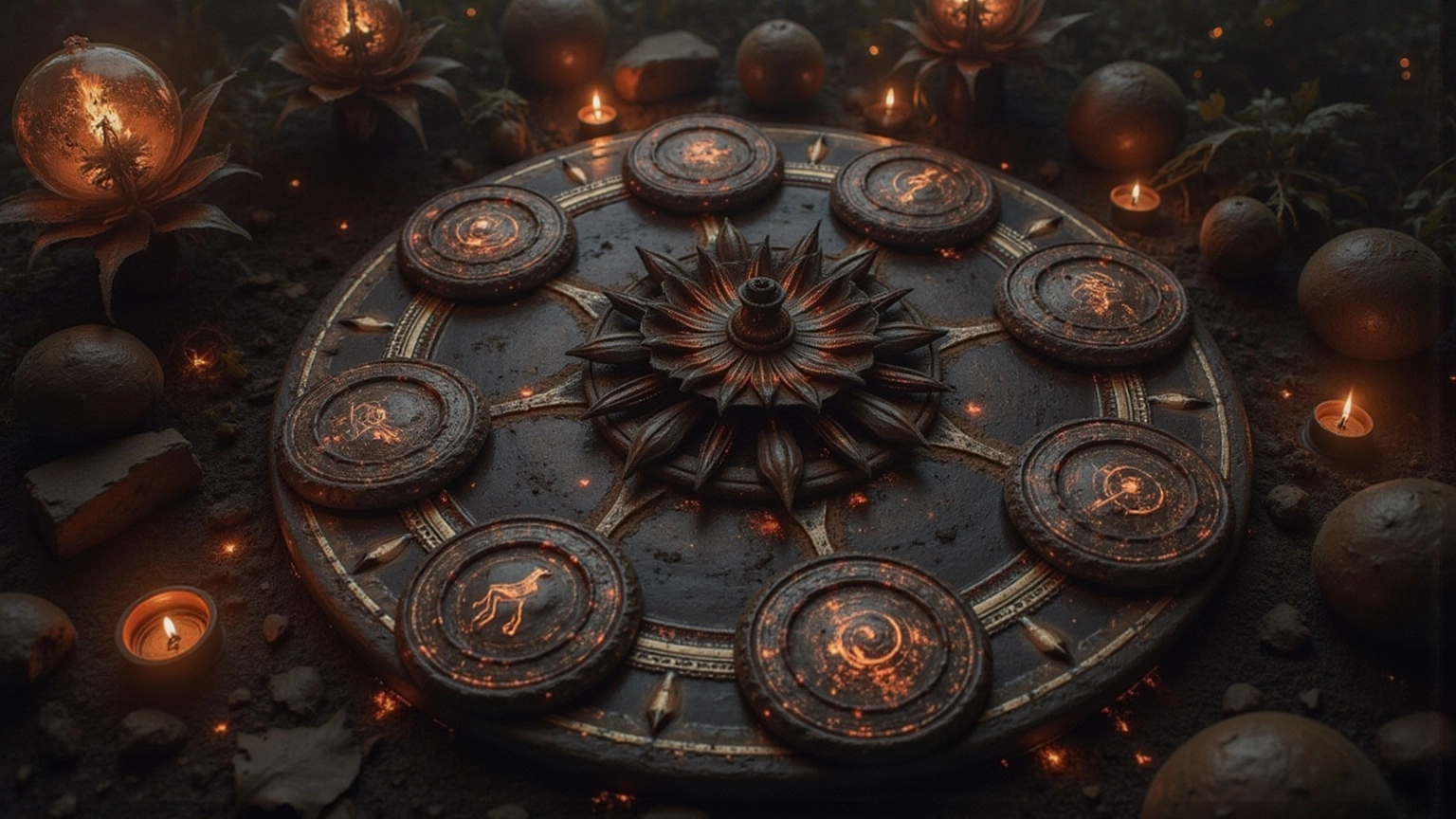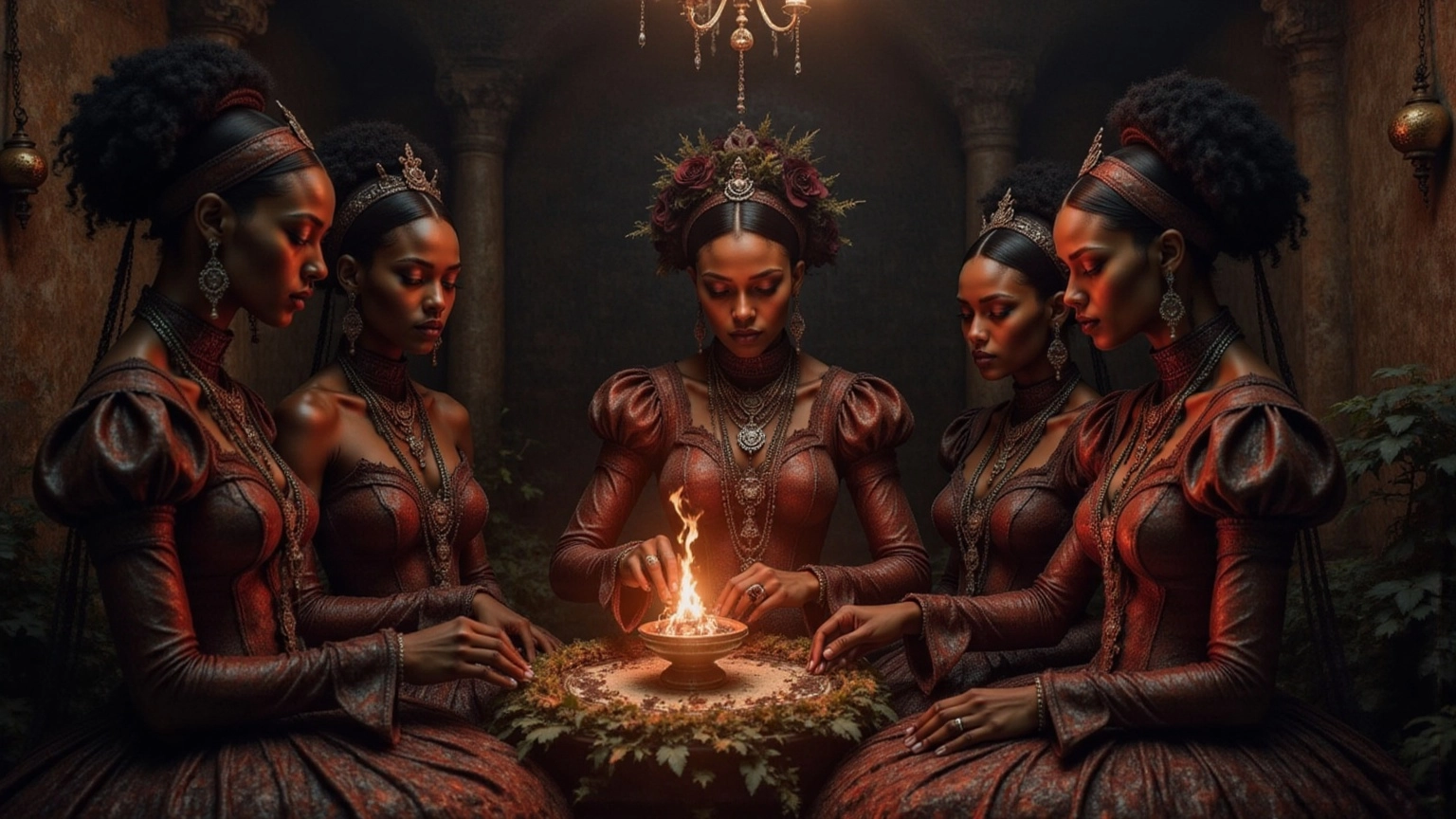
Understanding African Astrology: Origins, Components, and Significance
Share
Overview
African astrology—where ancient civilizations meet vibrant cultural symbols—serves as a profound system of divination. It reflects not just individual identities but communal ones too. This practice, deeply intertwined with nature and spirituality, is experiencing a renaissance. Especially among Black and brown women, there’s a fierce reclaiming of ancestral heritage. It’s a means of personal empowerment, a journey of self-exploration.
But why now? What draws these women back to their roots? The answer lies in the seductive pull of heritage, a call to embrace the past while forging a new path. This isn’t just astrology; it’s a rebellion against the mundane, a dance with the cosmos that invites you to explore your deeper self.
Imagine the stars whispering secrets, the earth grounding you in your truth. This is not merely a revival; it’s a movement. A bold assertion that your identity is rich, layered, and worth reclaiming. So, are you ready to dive into this cosmic journey? The stars await your exploration.
Introduction
African astrology isn’t just about stars; it’s a vibrant tapestry woven from the continent’s cultural and spiritual threads. This ancient system offers not just insights into personal identity through its unique zodiac signs, but acts as a bridge to ancestral wisdom and communal bonds. As the world opens its arms to diverse spiritual practices, one burning question emerges: how can embracing African astrology ignite a fire within individuals to reconnect with their roots and navigate life with sharpened awareness?
Defining African Astrology: An Overview
This ancient and profound system of divination? It analyzes celestial movements and their raw influence on human experiences. Forget Western astrology, with its twelve zodiac signs and constellations; African astrology from the continent bursts forth with a kaleidoscope of cultural symbols and practices. These symbols are woven tightly into the fabric of nature, community roles, and ancestral wisdom, reflecting a holistic approach that demands attention. The Zodiac? It’s a tapestry of 12 signs, each pulsating with distinct characteristics and attributes, offering piercing insights into personality traits based on birthdates. Take the 'Wealth Of Amber And Silver' sign—individuals born under it radiate emotional depth and unwavering convictions. Then there’s the 'Family' sign, a beacon of compassion and mediation skills.
This system runs deep, ingrained in the religious beliefs of diverse cultures across the continent, where African astrology serves as a vital instrument for navigating life’s journey and fate. In the realm of modern metaphysics, African astrology from the continent is experiencing a renaissance, as seekers yearn to reconnect with their roots and explore alternative practices. Traditional celestial insights are being wielded as tools for self-exploration and healing, seamlessly woven into everyday lives alongside other metaphysical practices. This resurgence? It’s especially vibrant among Black and brown women, reclaiming these traditions as integral to their identity and personal journeys, boldly asserting their Black personhood in the process.
As the prejudice surrounding non-Christian beliefs fades—thanks in part to the colonial history of Christianity—African astrology is emerging into the light. The term 'occult' has long cast a shadow within the Black Christian community, complicating the acceptance of traditional belief systems from the continent. Yet, a shift is underway. Many are now embracing its teachings, fueled by social media and community gatherings. This evolution underscores the importance of celestial traditions—not just as cultural foundations but as vibrant elements of contemporary beliefs, empowering individuals to navigate their lives with heightened awareness of themselves and their ancestral heritage.

Historical Origins of African Astrology
African astrology has roots that dig deep into the ancient civilizations of the continent—Egyptians, Malians, and Yoruba tribes. These cultures wove astrological systems, such as African astrology, that pulse with their cosmology and mythology.
Take the Dendera Zodiac from ancient Kemet, one of the earliest astrological charts, a testament to how celestial bodies shape our lives and spiritual practices. And then there's geomancy—a divinatory art of casting bones or earth—serving as a cornerstone in many astrological traditions, revealing the vital link between earth and cosmos.
This vibrant tapestry of African astrology not only reflects the historical significance of these civilizations but also breathes life into modern practices, offering profound insights into personal and cultural identity. Embrace traditional celestial practices, and you'll unlock a treasure trove of knowledge that fosters balance and harmonious living.
Dr. Asanee Brogan, a spiritual coach, highlights its enriching potential. Understanding your zodiac sign? It's more than just a label; it enhances personal awareness and guides your life choices, becoming an invaluable tool for those yearning for deeper connections to themselves and their heritage.

Key Components and Characteristics of African Astrology
Astrology from the continent, known as African astrology, pulses with life, deeply intertwined with the natural world and social dynamics, adorned with a riot of symbols that scream significance. The zodiac? A fierce ensemble of twelve distinct signs, each tethered to elements like trees, animals, and celestial bodies. Take the Baobab Tree—towering at sixty feet, hoarding hundreds of liters of water—a potent emblem of strength and resilience. The Kola Nut? It embodies prosperity and the spirit of community. These symbols aren’t mere reflections; they resonate with the very heartbeat of the people.
Geomancers wield their craft like sorcerers, casting bones or earth to unveil patterns that whisper secrets of life and destiny. This ancient art reveals the intricate web binding all living beings, guided by the watchful eyes of ancestral spirits. It’s a cosmic dance, where the heavens and earth entwine, celestial movements delivering divine messages that pulse through daily existence.
Now, contrast this with Western horoscopes—twelve zodiac signs, yes, but rooted in planetary positions. Here, African astrology reveals the zodiac's twelve signs that spring from ancestral symbols and rich cultural tales, offering a unique lens into heritage. This age-old practice is experiencing a renaissance, as seekers yearn to reconnect with their roots. It’s a call to grasp one’s place in the grand tapestry of life. As Jessica Verge notes, 'Today, African astrology is undergoing a revival as individuals strive to reconnect with ancestral knowledge,' a powerful reminder of its relevance in our modern world.

Cultural Significance and Spiritual Role of African Astrology
Traditional divination? It's not just a practice; it's the very lifeblood of countless communities across the continent, a tapestry woven with rituals, ceremonies, and personal guidance. It connects us to our ancestral roots, a powerful force that helps us tackle life's chaos with a fierce sense of belonging and identity. Ever pondered your zodiac sign? Those celestial markers are more than just symbols; they’re gateways to understanding your own journey.
Spirituality dances hand-in-hand with astrology here, where the movements of the stars echo the divine will, shaping decisions and actions within the community. Think about it: in many cultures, celestial insights are woven into life’s pivotal moments—weddings, naming ceremonies—each one a thread in the fabric of harmony between the individual, their community, and the universe.
Statistics don’t lie; a significant slice of the population dives headfirst into astrological practices, seeing them as essential tools for deciphering personal and communal identity. This isn’t just about stars; it’s about the profound interconnectedness of individuals with their heritage and the cosmos. What can you tell me about African astrology? It’s not merely a practice; African astrology serves as a vital pulse of cultural identity and spiritual guidance. So, are you ready to explore this cosmic journey?

Conclusion
African astrology isn’t just some celestial pastime; it’s a deep dive into personal identity, community vibes, and ancestral whispers. Forget the twelve zodiac signs of Western astrology—this is a vibrant tapestry, alive with cultural symbols and raw natural elements. It’s an ancient practice that’s more than self-discovery; it’s a lifeline, binding communities and spiritual beliefs in a powerful embrace.
Let’s talk roots. This article pulls you into the historical undercurrents of African astrology, tracing its lineage back to ancient civilizations like the Egyptians and the Yoruba tribes. It’s a journey through time, showcasing its evolution and modern-day revival. The twelve zodiac signs? Each one is a universe of unique traits, intricately tied to nature’s symbols. And then there’s traditional divination, like geomancy, connecting souls to their heritage and the cosmos. This revival, especially among Black and brown women, is a fierce reclamation of identity and cultural heritage.
So, why does African astrology matter? It’s not just a method of divination; it’s a vital thread woven into the cultural fabric of countless communities. Embracing these ancient practices isn’t just about personal growth; it’s a deep dive into understanding your place in this chaotic world. Engaging with African astrology is an invitation to explore your roots, igniting a sense of belonging and empowerment. This cosmic journey isn’t merely about stars; it’s about reconnecting with ancestral wisdom and navigating life with a fierce sense of purpose and identity.
Frequently Asked Questions
What is African astrology?
African astrology is an ancient system of divination that analyzes celestial movements and their influence on human experiences, incorporating a variety of cultural symbols and practices unique to the continent.
How does African astrology differ from Western astrology?
Unlike Western astrology, which is based on twelve zodiac signs and constellations, African astrology features a diverse tapestry of symbols that reflect nature, community roles, and ancestral wisdom, offering a more holistic approach.
How many signs are there in African astrology, and what do they represent?
African astrology comprises 12 signs, each with distinct characteristics and attributes that provide insights into personality traits based on birthdates. For example, the 'Wealth Of Amber And Silver' sign is associated with emotional depth, while the 'Family' sign signifies compassion and mediation skills.
What role does African astrology play in various cultures across the continent?
African astrology is deeply ingrained in the religious beliefs of diverse cultures and serves as a vital tool for navigating life's journey and fate, reflecting the interconnectedness of spirituality and daily life.
Why is there a resurgence of interest in African astrology today?
There is a renaissance of African astrology as individuals, particularly Black and brown women, seek to reconnect with their roots and explore alternative practices, integrating traditional celestial insights into their lives for self-exploration and healing.
How has the perception of African astrology changed within the Black Christian community?
As prejudice against non-Christian beliefs diminishes, more individuals within the Black Christian community are embracing African astrology, moving away from the historical stigma associated with the term 'occult' and recognizing the value of these traditional belief systems.
What factors are contributing to the growing acceptance of African astrology?
The rise of social media and community gatherings has played a significant role in promoting the teachings of African astrology, highlighting its importance as a cultural foundation and a contemporary belief system that empowers individuals to understand their identity and ancestral heritage.
